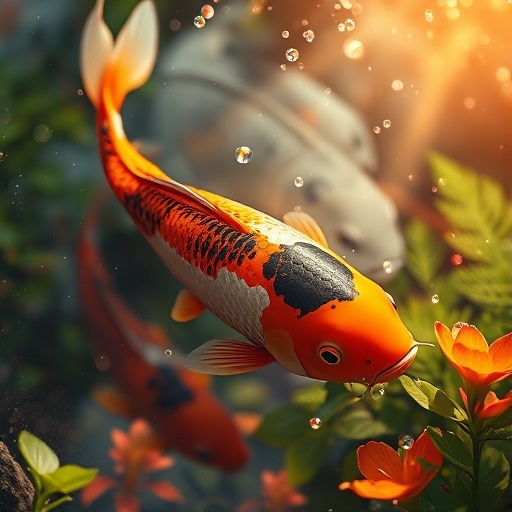The koi fish, a colorful and vibrant aquatic creature, has been an important symbol in many cultures, especially in East Asia. In particular, it holds significant meaning in Japan, where it is associated with health, good fortune, and perseverance. The koi’s symbolism is tied to its remarkable characteristics, both in terms of its natural life and its cultural representation.
Health Benefits of Koi Fish
In the realm of health, koi fish are often seen as a symbol of vitality and strength. Known for their longevity, koi can live for several decades, sometimes even up to 200 years in optimal conditions. This remarkable lifespan is attributed to their resilience and ability to adapt to various environments. In many cultures, especially in Japan, the koi fish is associated with life force, endurance, and overall well-being. Observing koi swimming in ponds or gardens is believed to promote relaxation, reduce stress, and improve mental health. The soothing sound of water combined with the graceful movement of the koi creates a calming atmosphere, which can positively influence one’s health.
Koi Fish and Good Fortune
The koi fish is also strongly tied to good luck and fortune. In Chinese culture, the koi is considered a symbol of wealth and prosperity. This connection is particularly prominent in the legend of the koi fish transforming into a dragon. According to the myth, a koi swam up the Yellow River, successfully leaping over the Dragon Gate waterfall. As a reward for its perseverance, the koi was transformed into a dragon, symbolizing transformation and success. This tale inspires many to view the koi as a symbol of overcoming challenges and achieving greatness, particularly in financial and career endeavors.
In Japan, koi are often seen as symbols of family and relationships, with different colors representing various forms of luck. For example, a red koi symbolizes love and affection, while a gold koi is thought to attract wealth. Because of these meanings, koi are often placed in gardens, homes, and businesses to invite good fortune and prosperity.
The Role of Koi Fish in Feng Shui
Koi fish are also prominently featured in Feng Shui, the ancient Chinese practice of harmonizing the environment. In this context, koi are believed to bring positive energy (chi) into a home or workplace. The placement of koi images or actual koi ponds can create a flow of beneficial energy, leading to success in various aspects of life, including health, wealth, and relationships. The presence of koi is thought to encourage good fortune, and many Feng Shui practitioners recommend placing koi in specific areas of the home or office to enhance prosperity.
Caring for Koi to Maintain Health and Luck
Maintaining the health of koi is crucial to preserving their symbolic value. Keeping koi in clean, well-maintained water is essential for their health, and a healthy koi is seen as a reflection of a prosperous and harmonious life. People who care for koi are often believed to attract good luck through their dedication and attention to detail.
The koi fish continues to be a symbol that bridges the natural world with deeper philosophical and cultural meanings. Whether in terms of its symbolism for health and longevity or its association with good fortune and transformation, the koi fish remains a timeless symbol of strength, success, and well-being.

